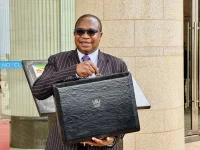The government is considering making changes to some of the taxes proposed in the 2025 National Budget. This comes after business leaders and economists raised concerns about the impact of certain taxes on businesses. Minister Mthuli Ncube, who is in charge of Finance, Economic Development and Investment Promotion, spoke about this at a meeting in Harare on Monday.
He said the government has asked the Treasury to study how the intermediated money transfer tax (IMTT) affects businesses. They are open to making changes based on what the study finds. He encouraged more businesses to share how the IMTT has impacted them. Any adjustments could be made in January or during the midterm policy review.
Business leaders say the 2 percent IMTT tax has hurt their performance. It has reduced their profits, sales, and ability to compete. They also say it has increased their expenses, like staff costs, electricity, rent, bank charges, cleaning, and security.
Minister Ncube explained that the tax measures are meant to benefit the economy. Some are related to health, protecting local industries, and the environment. For example, he decided to put a surtax on plastic bags instead of closing down the companies that make them. He said this was a "green" aspect of the budget.
The tax on fast foods is also seen as a good thing. The money raised will be used to help the health sector, which may have less funding due to global changes. Minister Ncube said promoting and encouraging investment in charging stations for electric vehicles is another positive "green tax" that many countries are looking into.
The 2025 budget also aims to provide incentives for local manufacturing, especially in the automotive industry. This includes making cars and buses. The goal is to boost local industry and reduce the need for imports.
He said the government has asked the Treasury to study how the intermediated money transfer tax (IMTT) affects businesses. They are open to making changes based on what the study finds. He encouraged more businesses to share how the IMTT has impacted them. Any adjustments could be made in January or during the midterm policy review.
Business leaders say the 2 percent IMTT tax has hurt their performance. It has reduced their profits, sales, and ability to compete. They also say it has increased their expenses, like staff costs, electricity, rent, bank charges, cleaning, and security.
Minister Ncube explained that the tax measures are meant to benefit the economy. Some are related to health, protecting local industries, and the environment. For example, he decided to put a surtax on plastic bags instead of closing down the companies that make them. He said this was a "green" aspect of the budget.
The tax on fast foods is also seen as a good thing. The money raised will be used to help the health sector, which may have less funding due to global changes. Minister Ncube said promoting and encouraging investment in charging stations for electric vehicles is another positive "green tax" that many countries are looking into.
The 2025 budget also aims to provide incentives for local manufacturing, especially in the automotive industry. This includes making cars and buses. The goal is to boost local industry and reduce the need for imports.












